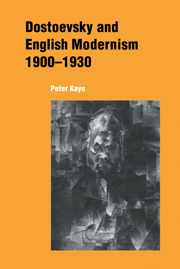Book contents
- Frontmatter
- Contents
- Acknowledgments
- 1 Introduction
- 2 Prophetic rage and rivalry: D. H. Lawrence
- 3 A modernist ambivalence: Virginia Woolf
- 4 Sympathy, truth, and artlessness: Arnold Bennett
- 5 Keeping the monster at bay: Joseph Conrad
- 6 Dostoevsky and the gentleman–writers: E. M. Forster, John Galsworthy, and Henry James
- Conclusion
- Notes
- Selected bibliography
- Index
3 - A modernist ambivalence: Virginia Woolf
Published online by Cambridge University Press: 22 September 2009
- Frontmatter
- Contents
- Acknowledgments
- 1 Introduction
- 2 Prophetic rage and rivalry: D. H. Lawrence
- 3 A modernist ambivalence: Virginia Woolf
- 4 Sympathy, truth, and artlessness: Arnold Bennett
- 5 Keeping the monster at bay: Joseph Conrad
- 6 Dostoevsky and the gentleman–writers: E. M. Forster, John Galsworthy, and Henry James
- Conclusion
- Notes
- Selected bibliography
- Index
Summary
Like Lawrence, Woolf first encountered Dostoevsky through a French translation of Crime and Punishment. She read the novel in 1912 while on her sexually disappointing honeymoon with Leonard. Lawrence, by contrast, had read it in the midst of the impassioned ambivalence of his romance with Jessie Chambers. The differing passional contexts of their first readings set the tone of all future readings. Unlike Lawrence, who could never escape the abrasive, discordant presence of his rival, Woolf always kept a safely ironic distance from Dostoevsky, never viewing him as a competitor. Her comments about his works, typically more balanced and penetrating than Lawrence's, reflect a patrician uncertainty about how the barbarian in the foyer of modern fiction should be treated.
Her response to Dostoevsky can be divided into three stages. The first, 1912 to 1920, covers the period in which the Constance Garnett translations were released. Woolf's letters and reviews during this time reveal her attraction to Dostoevsky's psychological portraits, especially his graphic renderings of tumultuous consciousness, and her discomfort with his alleged absence of form. Perhaps because she too readily subscribed to Dostoevskian stereotypes of her era and too easily dismissed Dickens, Balzac, Hugo, and other romantic realists, Woolf could not place Dostoevsky within the traditions of the novel and found no evidence of artistic control or literary shaping.
The second stage of her response, 1921 to 1925, represents the high point of her interest and marks a number of important crossroads in her own career.
- Type
- Chapter
- Information
- Dostoevsky and English Modernism 1900–1930 , pp. 66 - 95Publisher: Cambridge University PressPrint publication year: 1999



